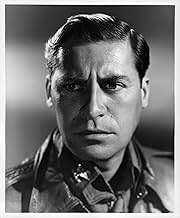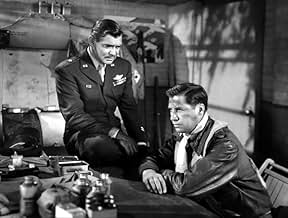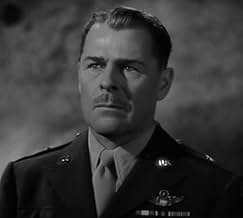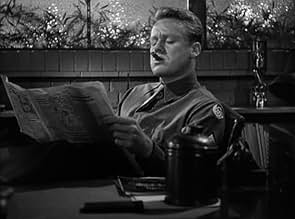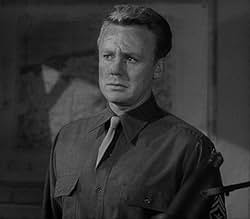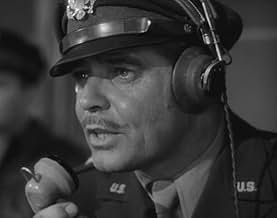NOTE IMDb
7,3/10
2,2 k
MA NOTE
Ajouter une intrigue dans votre langueArmy generals struggle with the decision to prioritize bombing the German factories producing new jet fighters over the extremely high casualties the mission will cost.Army generals struggle with the decision to prioritize bombing the German factories producing new jet fighters over the extremely high casualties the mission will cost.Army generals struggle with the decision to prioritize bombing the German factories producing new jet fighters over the extremely high casualties the mission will cost.
- Réalisation
- Scénario
- Casting principal
- Récompenses
- 3 victoires et 2 nominations au total
Avis à la une
There must be at least one whole generation of viewers who don't even know this film exists! Yet it remains one of the very best WWII films ever made. I first saw as a child, when it was quite new, and have seen it several times since. It has never lost its hold and that, I suppose, principally because of Clark Gable's superb performance (although the other parts are all very strongly done). It really must be one of his finest screen roles and that alone, one might think, would ensure that it is never long absent from television screens. Sadly it has been shown in Britain but once that I know of, and is not available here on a PAL-system video, although "Twelve O'Clock High" is available and often screened. In many ways the two films complement each other, each not wholly to be appreciated without seeing the other. "Twelve O'Clock High" has an almost exclusively military focus while "Command Decision" brings in the effect of political factors on military decisions. The latter film, however, has an edge: Gable on top form and that was always something very special.
Command Decision was adapted from a Broadway play that ran for 409 performances the previous year. Tony Awards were won by Paul Kelly who played General K.C. Dennis and James Whitmore for Tech Sergeant Emanuel Evans. The play shows the process of making military decisions when you have to factor in the politicians who control the purse strings. It's a necessary evil in a society that values civilian control of the military.
Both during and after World War II there was a debate among the British and American air commanders over the value of daylight versus nighttime bombing attacks. The British did night raids over Germany, responding in kind to what the Luftwaffe had done to them. Fly over at high altitudes and just drop the bombs. It did make for fewer casualties among the RAF pilots of their Lancaster bombers.
The Americans opted for daylight raids at a lower altitude trying to hit certain strategic objectives. In Command Decision it involves three factories that intelligence has learned are manufacturing new jet aircraft. If the Nazis had ever developed the far advanced jets against the Allied propeller aircraft in any number, the course of the war over Europe might have changed. Just like the V-2 rockets were developed too late to help the Axis cause.
Command Decision has Clark Gable leading a distinguished cast as the general who has to make the decision about whether to bomb or not, to go into Germany's heartland without fighter escort. Unfortunately his purely military outlook is not shared by his immediate superior Walter Pidgeon who has to factor in the politicians in Congress who read the dispatches by correspondents like Charles Bickford here about the appalling losses in American life.
In many ways Pidgeon has the most difficult part in the film. He has to take in the voices of objection raised by the visiting Congressional delegation led by Edward Arnold. Pidgeon is a politician, but purely by necessity. We admire Gable's stand on principle, but the audience also respects Pidgeon and sympathizes with him.
On Broadway Command Decision takes place in the headquarters and to make it better for the screen, playwright William Wister Haines wrote an additional scene that Paul Kelly did not do on Broadway. Clark Gable on a radio microphone tries to talk down a bombardier who is piloting a plane where the pilot and co-pilot are wounded and killed. It's a harrowing scene and one of the best Clark Gable ever did. Gable must have drawn from his World War II experience, he was a tailgunner in our Army Air Corps and flew many a B-17 mission over Germany.
Rounding out a distinguished group of MGM contractees are Van Johnson, Brian Donlevy, Marshall Thompson, Cameron Mitchell, Warner Anderson, Ray Collins, John McIntire and John Hodiak. They all cast well as Army Air Force personnel. Johnson plays the part that James Whitmore originated on stage and provides what little humor there is in this film.
The main criticism of Command Decision has always been that it is too stagey. But I found it an absorbing account of the decision making process in a military command.
Both during and after World War II there was a debate among the British and American air commanders over the value of daylight versus nighttime bombing attacks. The British did night raids over Germany, responding in kind to what the Luftwaffe had done to them. Fly over at high altitudes and just drop the bombs. It did make for fewer casualties among the RAF pilots of their Lancaster bombers.
The Americans opted for daylight raids at a lower altitude trying to hit certain strategic objectives. In Command Decision it involves three factories that intelligence has learned are manufacturing new jet aircraft. If the Nazis had ever developed the far advanced jets against the Allied propeller aircraft in any number, the course of the war over Europe might have changed. Just like the V-2 rockets were developed too late to help the Axis cause.
Command Decision has Clark Gable leading a distinguished cast as the general who has to make the decision about whether to bomb or not, to go into Germany's heartland without fighter escort. Unfortunately his purely military outlook is not shared by his immediate superior Walter Pidgeon who has to factor in the politicians in Congress who read the dispatches by correspondents like Charles Bickford here about the appalling losses in American life.
In many ways Pidgeon has the most difficult part in the film. He has to take in the voices of objection raised by the visiting Congressional delegation led by Edward Arnold. Pidgeon is a politician, but purely by necessity. We admire Gable's stand on principle, but the audience also respects Pidgeon and sympathizes with him.
On Broadway Command Decision takes place in the headquarters and to make it better for the screen, playwright William Wister Haines wrote an additional scene that Paul Kelly did not do on Broadway. Clark Gable on a radio microphone tries to talk down a bombardier who is piloting a plane where the pilot and co-pilot are wounded and killed. It's a harrowing scene and one of the best Clark Gable ever did. Gable must have drawn from his World War II experience, he was a tailgunner in our Army Air Corps and flew many a B-17 mission over Germany.
Rounding out a distinguished group of MGM contractees are Van Johnson, Brian Donlevy, Marshall Thompson, Cameron Mitchell, Warner Anderson, Ray Collins, John McIntire and John Hodiak. They all cast well as Army Air Force personnel. Johnson plays the part that James Whitmore originated on stage and provides what little humor there is in this film.
The main criticism of Command Decision has always been that it is too stagey. But I found it an absorbing account of the decision making process in a military command.
In a larger sense "Command Decision" is not really a war movie but a film about the responsibility of command and leadership. It is one of the few films that effectively explores these topics; and belongs right up there with the original "Flight of the Phoenix" and "The Red Tent". Not having the visual power of those two films (the limited combat/action scenes are almost entirely stock footage), it must focus more narrowly on the human complications arising from the responsibility of command. The contradiction being that while a leader must cease to be human, no one who can do this is fit to be a leader.
Adapted from a stage play, "Command Decision" suffers from a fair amount of "long-windedness". Fortunately the most long-winded character (Major General Kane-played by Walter Pigeon), is well written and has many substantial things to convey. Much like his character in "Forbidden Planet", Pigeon is tasked with inserting historical and philosophical details into the story, and his commanding screen presence makes him ideal for this purpose.
Brigadier General K.C. Dennis (Clark Gable) has the most screen time and most challenging role, as his character is the guy stuck between a rock and a hard place. He is accountable for making the hard decisions that send his men off to die, but has a fragile authority dependent on how much independence his superiors are allowing him at a particular point in time. Gable does fine in this part, probably his best totally "serious" performance. Although the film takes pains to use the German high command to illustrate examples of bad leadership, it is easy to infer that the same mindset applies to the Allies. With many military leaders distorting events to cover their own ass and willing to sacrifice men for their own career advancement and personal ideology.
The premise of the film is the Air Corps discovery that the Germans have developed the first jet combat plane. Based on the real life Messerschmitt Me-262 (shown as a model in the film and in some archival footage), it is called the "Lantze-Wolf" here and considered so effective as a fighter aircraft that full production would allow the Luftwaffe to regain air supremacy over Europe.
The planes are being assembled in three cities deep in Germany. The only hope to delay their full production is "Operation Stitch" (named for its goal of gaining a stitch in time), a plan to attack these sites through dangerous daylight bombing raids. Dangerous because they will be heavily defended and because the bombers will have to go the final hundred miles without fighter escort-since the America fighters do not have the range to reach and return from the target. This type of daylight bombing was called precision bombing because the bomb-site was more effective with better visibility and a lower altitude. The alternative was safer but less accurate saturation bombing at night (insert Dresden here).
General Dennis must decide whether to start the operation, and then when the bombers take substantial punishment he must decide whether to continue in the expectation of additional high losses.
The film takes certain historical liberties as only after a postwar evaluation of the actual ME-262 did anyone really understand its strategic potential (in the hands of well trained pilots) as a fighter aircraft. Until the end Hitler insisted that it be utilized almost exclusively as a bomber. Although able to carry out this alternative role, its bomb load capacity was too little for any significant impact. That the ME-262 is more a footnote to the war than a major element was due more to Hitler's decision than to any allied efforts to limit its production.
Then again, what do I know? I'm only a child.
Adapted from a stage play, "Command Decision" suffers from a fair amount of "long-windedness". Fortunately the most long-winded character (Major General Kane-played by Walter Pigeon), is well written and has many substantial things to convey. Much like his character in "Forbidden Planet", Pigeon is tasked with inserting historical and philosophical details into the story, and his commanding screen presence makes him ideal for this purpose.
Brigadier General K.C. Dennis (Clark Gable) has the most screen time and most challenging role, as his character is the guy stuck between a rock and a hard place. He is accountable for making the hard decisions that send his men off to die, but has a fragile authority dependent on how much independence his superiors are allowing him at a particular point in time. Gable does fine in this part, probably his best totally "serious" performance. Although the film takes pains to use the German high command to illustrate examples of bad leadership, it is easy to infer that the same mindset applies to the Allies. With many military leaders distorting events to cover their own ass and willing to sacrifice men for their own career advancement and personal ideology.
The premise of the film is the Air Corps discovery that the Germans have developed the first jet combat plane. Based on the real life Messerschmitt Me-262 (shown as a model in the film and in some archival footage), it is called the "Lantze-Wolf" here and considered so effective as a fighter aircraft that full production would allow the Luftwaffe to regain air supremacy over Europe.
The planes are being assembled in three cities deep in Germany. The only hope to delay their full production is "Operation Stitch" (named for its goal of gaining a stitch in time), a plan to attack these sites through dangerous daylight bombing raids. Dangerous because they will be heavily defended and because the bombers will have to go the final hundred miles without fighter escort-since the America fighters do not have the range to reach and return from the target. This type of daylight bombing was called precision bombing because the bomb-site was more effective with better visibility and a lower altitude. The alternative was safer but less accurate saturation bombing at night (insert Dresden here).
General Dennis must decide whether to start the operation, and then when the bombers take substantial punishment he must decide whether to continue in the expectation of additional high losses.
The film takes certain historical liberties as only after a postwar evaluation of the actual ME-262 did anyone really understand its strategic potential (in the hands of well trained pilots) as a fighter aircraft. Until the end Hitler insisted that it be utilized almost exclusively as a bomber. Although able to carry out this alternative role, its bomb load capacity was too little for any significant impact. That the ME-262 is more a footnote to the war than a major element was due more to Hitler's decision than to any allied efforts to limit its production.
Then again, what do I know? I'm only a child.
This is an under-appreciated gem of a move.
To start with, the core story sounds utterly fantastic, but it is partly true. There was never a "Lance-Wulf 190", but there really was a Messerschmidt Me-262 in World War 2. The Me-262 wasn't quite the wonder-plane which the mythical Lance-Wulf was, but it was a swept-wing jet with a top speed of 540 mph, a blinding speed for the time. And, as fighter pilots say, "speed is life".
American bombing in August, 1943 did delay the introduction of the real Me-262. (The pre-production aircraft were wrecked on an assembly line, forcing a delay of several months.) The irony is that the German jet fighter program was really stymied by Hitler's aversion to defensive weapons and the German feeling that the war could be won with existing fighter types.
There is, however, a "message" in this film which fully applies to civilian life. You know that everything is okay just now, but this will soon come to an end. Given those facts, are you willing to take some massive losses now and solve the problem? Or do you just wait for the situation to become visible to everyone before you act?
I don't know how many times I've seen people--even bright ones--opt for the "wait and see" course of action. It never works.
Just as Betty Davis's 1938 film "Jezebel" was overshadowed by "Gone With The Wind", this film was overshadowed by "Twelve O'Clock High".
To start with, the core story sounds utterly fantastic, but it is partly true. There was never a "Lance-Wulf 190", but there really was a Messerschmidt Me-262 in World War 2. The Me-262 wasn't quite the wonder-plane which the mythical Lance-Wulf was, but it was a swept-wing jet with a top speed of 540 mph, a blinding speed for the time. And, as fighter pilots say, "speed is life".
American bombing in August, 1943 did delay the introduction of the real Me-262. (The pre-production aircraft were wrecked on an assembly line, forcing a delay of several months.) The irony is that the German jet fighter program was really stymied by Hitler's aversion to defensive weapons and the German feeling that the war could be won with existing fighter types.
There is, however, a "message" in this film which fully applies to civilian life. You know that everything is okay just now, but this will soon come to an end. Given those facts, are you willing to take some massive losses now and solve the problem? Or do you just wait for the situation to become visible to everyone before you act?
I don't know how many times I've seen people--even bright ones--opt for the "wait and see" course of action. It never works.
Just as Betty Davis's 1938 film "Jezebel" was overshadowed by "Gone With The Wind", this film was overshadowed by "Twelve O'Clock High".
I found an old tape of Command Decision which I must have made 20 years ago. I concur with all those who have said that it is one of the best WW2 films ever made, but what struck me most forcefully was the fact that this highly intelligent, gripping and thoughtful film was made with a large crew of established filmstars by a completely commercial film studio. It brought home to me forcibly what was lost when the old studio system broke up and the sheer craftsmanship which it embodied was dispersed. The sheer childishness of most current films becomes even more evident.
Writing as one who lived through the bombing of Britain, the historical perspective on the Allied wartime bombing campaign was fascinating. One small complaint--all film coverage of the American campaign in WW2 seems to focus on the Flying Fortress. Actually, most of the bombs were dropped by the Consolidated Liberator squadrons--less photogenic but more effective!
Writing as one who lived through the bombing of Britain, the historical perspective on the Allied wartime bombing campaign was fascinating. One small complaint--all film coverage of the American campaign in WW2 seems to focus on the Flying Fortress. Actually, most of the bombs were dropped by the Consolidated Liberator squadrons--less photogenic but more effective!
Le saviez-vous
- AnecdotesClark Gable enlisted in the US Army Air Forces after his wife Carole Lombard died in a plane crash on a war bonds selling trip assisting the war effort. Gable went to Officers Candidate School (OCS), graduating as a second lieutenant, and was eventually promoted to major. He was trained as an aerial gunner and combat cameraman and was awarded both the Distinguished Flying Cross and Air Medal for at least five aerial bombing missions over Germany from England with the 351st Bomb Group (Heavy). Adolf Hitler personally offered a reward to the pilot or anti-aircraft gun crew who shot down Gable's plane.
- GaffesWhen General Dennis tries to talk down the bombardier flying the crippled bomber, the bombardier reports that the aircraft's fuel is exhausted. Presumably he had also dropped his bomb load over the target. His on-board supply of machine gun ammunition should be very low if not exhausted. Yet when the bomber crashes, it explodes and burns. If he has no bombs, no gas , and no machine gun ammunition, what's to burn?
- Citations
James Carwood: What's the answer, Brockie, all guts and no brain?
Elmer Brockhurst: No. That's putting it too simply. Dennis is one of those boys whose brain is fascinated by guts. He loves this lousy war.
- Versions alternativesAlso available in a computer colorized version.
- ConnexionsFeatured in Clark Gable: Tall, Dark and Handsome (1996)
Meilleurs choix
Connectez-vous pour évaluer et suivre la liste de favoris afin de recevoir des recommandations personnalisées
- How long is Command Decision?Alimenté par Alexa
Détails
Box-office
- Budget
- 2 467 000 $US (estimé)
- Durée
- 1h 52min(112 min)
- Couleur
- Rapport de forme
- 1.37 : 1
Contribuer à cette page
Suggérer une modification ou ajouter du contenu manquant


